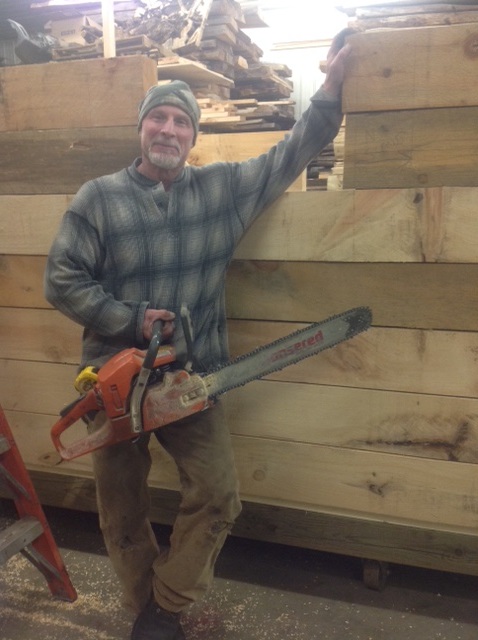You may not realize it when you see Ken Schels wielding his chainsaw at carving competitions, but he thinks deeply about trees. Emily Bright got a tour of Schels’ workshop and a glimpse into his mind as he sets about carving.
“When I grab my saw, I’m ready to carve,” says Ken Schels. “I’m hungry. I wanna make some sawdust. I look forward to it.”
Dressed in a plaid flannel and cap, Schels’ Eagle River workshop includes an 11 foot conference table cut from a single tree from Conover. Trees, Schels says, will tell you a story.
Unique growth patterns in the wood are what Schels, like his late father, Carl Schels, loves the most.
“You know my folks been in the area. They were married in 1939 in the Eagle River area here with $10 on their pocket. They went out to the Nicolet National Forest at that time, squatted on government land and lived there for 8 years without water or electricity…And living mainly on deer meat. My dad was an outlaw beaver trapper, so they’d been pioneers, and I am very proud of where we come from because I think it makes you who you are.”
His family was living in back in Eagle River by the time Schels was born, but their living always came from nature. He remembers peeling poplar trees as a boy in the summer and collecting broken limbs and branches.
Those branches became door handles and decorations, just some of the artistry that would later be on display at Carl’s Wood Museum, which hosted more than 40,000 visitors before it closed in 1996 at his father’s death at age 90.
Now it’s Schels’ turn to host visitors and clients in his shop, where he uses that same imaginative power to turn recycled metal into sculptures.
Recycled metal art. Whimsical wooden hobbit houses sturdy enough to live in. Even a tricked-out motorcycle has a story built into it. The seat is a saddle emblazoned with the Celtic god of the forest.
The whimsy around the shop is supported by a great deal of work and planning. That wood stacked on the left of the shop–two semi-loads of it—dries for at least 4 years before Ken carves or builds with it.
“That wood has a lot of power,” he explains. “The slower it dries, the least it’s gonna react, you know. you’re asking the cells to change very quickly…if you want to open the grain up, so you want to move slowly if you can.”
Schels admits planning new projects will keep him up at night so that he and his two employees don’t waste a minute during the day. At age 60, he has no plans to stop, though he admits the work is physically challenging.
There’s always something waiting to be built, another tree or heap of metal ready to tell a story, if only you look close enough to see it. Because if there’s one thing Schels learned from his father, it’s that nature is the true craftsman is nature.











